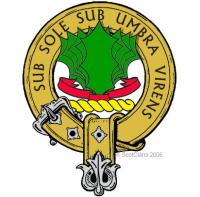
Clan Irvine
From the Brythonic word ‘ir-afon’ which means ‘green water’ comes Irvine. The name is territorial in origin, from an area in Dumfriesshire.
Records of the family date back to some time between 1124 and 1165. The family claim origin from the High Kings of Ireland, through to Scotland's Early Celtic Kings. Crinan Eryvine married the heiress of Malcolm II. Their son was Duncan who became King Duncan who is murdered at the beginning of Shakespeare's play MacBeth
William de Irwyn came from the town of Irvine in Ayrshire. He became Robert the Bruce's representative in the Royal forest of Drum. For his services he was awarded with the Barony of Drum in 1323 which included the Tower of Drum. A structure which had already existed from a time before the 12th Century as a royal hunting lodge. From this tower grew Drum Castle.
Across the river Dee from where the Irvine lands lay were the Keiths. There was a great deal of rivalry between them and this escalated into full scale war when in 1402 at the battle of Drumoak the Irvines engaged an army of Keiths and slaughtered them.
The third Laird of Drum, Alexander fought with the Earl of Mar in the French wars and later at the Battle of Harlaw in 1411. The site of he battle was very close to the Lands of Drum. Another Alexander, Sir Alexander de Irwyne fought a duel with ‘Hector of the Battles’, MacLean of Duart. The duel can only be described as a draw as after an intense battle both died from their wounds.
Around 1405 James I was kidnapped by the English. He languished there for eighteen years and the next Laird was heavily involved in the negotiations for his release. When the king returned he was resolved to settle a few scores against those who had refused to help but de Irwyne was rewarded with a knighthood. The King's vehemence against his enemies resulted in his murder in 1437 and Sir Alexander had to take control of Aberdeen in an attempt to restore order. The Sixth laird's similar diplomatic talents were appreciated by James V.
The sixth Laird's son fell at the Battle of Pinkie in 1547.
Like so many other families the period of the civil war effected the Irvine fortunes in a number of ways; Alexander the tenth laird had supported Charles I, offered Earldom of Aberdeen it never came to fruition as the king was executed in 1649 before it could be confirmed. The area around Drum was a stronghold of Covenanter sympathies. Covenanter forces besieged the castle, which was finally entered and looted. The Laird's sons were captured fighting for the Royalists, one died in the dungeons of Edinburgh castle while the other, Alexander was finally released and went on to become the eleventh Laird. He refused a peerage when Charles II would not offer any assistance for the hardship endured by the family for supporting his father. The eleventh Laird shocked the local community some time later when his first wife died and he married a sixteen year old shepherdess.
The fourteenth Laird was badly wounded at the Battle of Sheriffmuir in 1715 and died a few years later with no issue, the estates then passing to his uncle and on to John Irvine of Crimond. The seventeenth Laird, Alexander fought with the jacobites at Culloden. Like many other prominent Jacobites he was hunted by Cumberland, hiding in a secret chamber in his castle, then fleeing to France. He was later allowed to return to his estate.
The twenty-second Laird, also called Alexander fought during the Great War and was seriously wounded in 1916. He died in 1922 and was succeeded by his son Alexander who died young and had never married. The title passed to the second son, Quentin who became the Twenty-fourth Laird. He also served in the military, fighting in East Africa during World War 2. He died in 1975 and the castle of Drum was passed to the National Trust for Scotland. The title passed to another brother, Col. Charles Irvine M.C. On his death in 1992 the current Laird, David Irvine became the twenty-sixth Chief.
David had one last score to settle though; the feud with the Keiths had never been amicably settled so after 600 years in 2002 he met with the 13th earl of Kintore, Chief of Clan Keith to sign a formal peace treaty.







